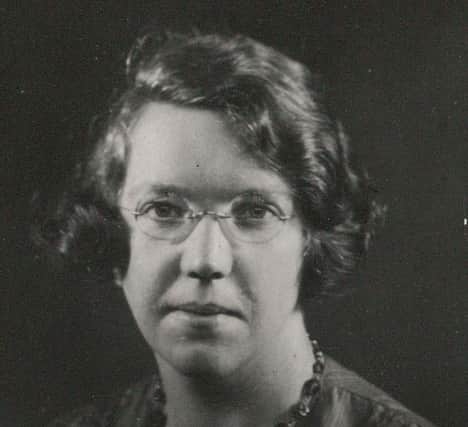The farmer's daughter who sacrificed her life for Jews in the Holocaust


In the early days of WWII, along with a small team of co-workers from neutral countries, Mary cared for thousands of refugees fleeing Hitler in Rivesaltes refugee camp in Southern France.
As war progressed the number of Jews in the camp greatly increased, as did the German-enforced, mass deportation of Jews to the heinous death camps.
Rivesaltes fast became a ‘sorting house’ for Jews.
Advertisement
Hide AdAdvertisement
Hide AdMary and her hugely courageous colleagues deftly manipulated exit papers for many of the children, transferring them to safe hideaways from the Germans.
Mary and two other women aid-workers were subsequently named by Israel as Righteous Among the Nations, a title bestowed on non-Jews who risked their lives during the Holocaust saving Jews from Hitler’s extermination camps.
Mary is the only person in Ireland who received the honour.
There are many similar accounts of Jews being saved from Hitler’s genocide by heroic, selfless, often un-recounted rescuers.
Some 25,000 of them from over 40 countries are remembered and named on the Wall of Honour, or commemorated by a tree, in the Garden of the Righteous at Yad Vashem in Jerusalem.
Advertisement
Hide AdAdvertisement
Hide AdThe name Yad Vashem comes from a verse in the Old Testament - “and to them will I give in my house and within my walls a memorial and a name (a ‘yad vashem’)... that shall not be cut off” - from the Book of Isaiah, chapter 56, verse five.
A News Letter reader contacted Roamer this week with details of the only name from Scotland on the Yad Vashem list of honours.
In 1997 the Church of Scotland missionary Jane Haining was recognised as Righteous Among the Nations for her work with Jewish schoolgirls in German-occupied Hungary during WWII.
Jane was deported by the Germans to Auschwitz where she died in 1944 aged 47.
Advertisement
Hide AdAdvertisement
Hide AdEarlier this month, very appropriately on Armistice Day, some of Jane Haining’s relatives, including her nephew Rob O’Brien from Ballygally, County Antrim, attended a special reunion to see her handwritten will and other personal documents found amongst the Church of Scotland’s archives in Edinburgh.
Her last letter, pencilled in German from Auschwitz to Margit Prem, the Hungarian head-teacher who ran the Scottish Mission in Budapest where she was matron, was dated 15 July 1944 - two days before Jane died.
Her message ended “I think of you day and night, lovingly and longingly. I am waiting for news of what everyone is doing, including your family, Margit. Is your old aunt still alive? There is not much to report from here. Even here on the way to Heaven are mountains, but further away than ours. I send appropriate greetings to the whole family and kiss and embrace you. Your loving Jane.”
When Rob O’Brien saw her photographs, letters and documents in Edinburgh on Armistice Day he said that his Aunt Jane’s story was one of bravery, selflessness and sacrifice.
Advertisement
Hide AdAdvertisement
Hide Ad“Jane put faith into action and had a love for everybody,” he added “the world would be a better place if we followed her example.”
Born in 1897, on a farm near Dunscore, Dumfriesshire, Jane was appointed Matron of the Girls’ Home of the Scottish Mission in Budapest, Hungary, in 1932.
She liked Hungary and Budapest and was soon fluent in the language.
She was dedicated to caring for and teaching the predominantly Jewish girls in the school next to the Girls’ Home.
Advertisement
Hide AdAdvertisement
Hide AdResponsible for 400 children from six to 16, Jane was loved and respected by the students as well as by her colleagues.
By 1940, faced with the worsening situation in Europe, she and other Scottish missionaries were ordered to return home.
Jane stayed!
She wrote to her bosses in Edinburgh - “If these children need me in days of sunshine, how much more do they need me in days of darkness?”
Food was scarce and she made dawn trips to the market to get what she could.
Advertisement
Hide AdAdvertisement
Hide AdWhen her girls’ shoes wore out she cut up her leather luggage-bags to make replacement soles.
When German troops began mass arrests of Jewish citizens Jane was ordered by the Gestapo to sew regulation yellow stars onto the Jewish children’s clothes.
Each time she stitched one onto a little shirt or blouse she wept.
In April 1944 the Gestapo arrived at the Mission, and interrogated her. It’s thought that she was betrayed by the school cook’s son-in-law who she reprimanded for pilfering the little food that she could get for the girls.
Advertisement
Hide AdAdvertisement
Hide AdThe Germans charged her with a number offences including working amongst Jews and weeping when her students had to attend class wearing yellow stars.
She was allowed 15 minutes to gather her belongings.
One of her former pupils Agnes Rostas recently revealed that she saw Jane being led away from the school by Gestapo officers.
Her last words to the sobbing children were “don’t worry, I’ll be back by lunch.”
What happened after that is uncertain, but it seems that she was held in a Budapest jail before being taken to Auschwitz and forced into hard labour. By August ‘prisoner number 79467’ was dead, probably gassed in the last ‘selections’ at Auschwitz before the camp was liberated.